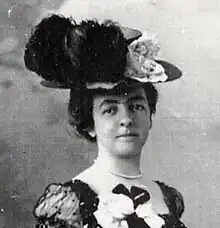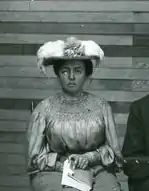Wrexie Leonard
Wrexie Leonard (September 15, 1867 – November 9, 1937), also known as Louise Leonard, was an American astronomer who worked as an assistant to Percival Lowell and published her observations of Mars. The Leonard Crater on Venus is named for her.
Wrexie Leonard | |
|---|---|
 Leonard in 1937 | |
| Born | Wrexie Louise Leonard September 15, 1867 |
| Died | November 9, 1937 (aged 70) |
| Scientific career | |
| Fields | Astronomy |
Biography
Wrexie Louise Leonard was raised in Troy, Pennsylvania, and later moved to Boston.[1] She was private secretary and assistant to the astronomer Percival Lowell for over two decades, from 1883 until Lowell's death.[1][2] In 1895, she traveled to Africa with Lowell to look for a site for a new observatory, which was later established in Flagstaff, Arizona.[1][3]
Leonard managed Lowell's correspondence, edited his many articles and speeches, and traveled with him extensively.[1] She supervised the Lowell Observatory in Flagstaff during his absences.[1] She carried out astronomical observations at the observatory in Arizona, after it was built in 1894, studying the planets Mercury, Venus, Jupiter, and especially Mars.[3] The observatory's logbooks show that "W.L.L." carried out observations frequently in the early years, and they include sketches that she made of Mars and Venus.[3] This indicates that she was regularly using the large telescope a half century before it became common for women in astronomy to do so.[3][4]

Leonard also accompanied Lowell to Tacubaya, outside Mexico City, when the large Clark refractor was shipped there in 1896 for one of several oppositions of Mars that she would observe.[5] In 1907, she published her drawings of Mars in Popular Astronomy with notes on the planet—its ice caps, Lowell's 'canals'— during some of the years when it was in opposition (1901, 1903, 1905).[3]
In 1904, Leonard was inducted into the Societé Astronomique de France, then an unusual honor for a woman.[3] She was also an honorary member of the Sociedad Astronomico de Mexico.[6]
After Lowell's death in 1916, she moved back to the eastern United States.[1] Five years later, she published the memoir Percival Lowell: An Afterglow,[7] which includes a passages from her correspondence with Lowell.[8] She lost money in the stock market crash of 1929 and afterwards moved into a home for the aged in Roxbury, Massachusetts.[1]
Legacy
The 31.7 kilometres (19.7 mi) wide Leonard crater on Venus (latitude −73.8, longitude 185.2) is named after her.[3]
Leonard was the basis for the character Lulu in Jan Millsapps' 2014 novel Venus on Mars.[9]
Notes and references
- Putnam, William Lowell. The Explorers of Mars Hill. Light Technology Publishing, 1994.
- "Obituary." Boston Evening Transcript, Nov. 12, 1937.
- Millsapps, Jan. "Wrexie Louise Leonard: Take a Letter, Take a Look". The Lowell Observer, no .80, Fall 2008. Archived
- Millsapps, Jan. "Celebrating Women’s History Month — On Mars". Huffpost Science blog.
- Sheehan, William, and Christopher J. Conselice. "Galactic Encounters: Our Majestic and Evolving Star-System, From the Big Bang to Time’s End." Physics Today, vol. 68, no. 6 (2015), p. 54.
- Plutovian. "Wrexie and Percy". Finding Pluto blog.
- Goodman, Susan. Republic of Words: The Atlantic Monthly and Its Writers, 1857–1925. UPNE, 2011, p. 178.
- Leonard, Louise. Percival Lowell: An Afterglow. RG Badger, 1921, pp. 52–-.
- Millsapps, Jan. "Wrexie, Ada, let’s celebrate!". Venus on Mars blog, March 24, 2010.